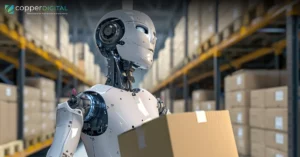Intelligent Automation (IA) is truly shaking things up in the business world! With the help of artificial intelligence and machine learning, IA is streamlining complex processes that can boost your business efficiency like never before! Did you know that the IA market is expected to skyrocket to USD 51.26 billion by 2032, growing at an impressive 13.89% CAGR? It is a clear indication that industries like healthcare, fintech, supply chain, and even retail industries are recognizing its value. In fact, a recent survey revealed that 70% of business owners see AI-driven automation as essential for future success. As companies strive for operational excellence, IA empowers them to make data-driven decisions, enhance customer experiences, and foster innovation. Imagine having the ability to automate tedious tasks while freeing up your team to focus on strategic initiatives! In today’s competitive landscape, embracing Intelligent Automation is not just an option; it is a necessity for organizations looking to thrive and stay ahead of the curve. So, why not dive into the world of IA and discover how it can transform your business operations? That is why, in this post, we are going to talk about how you can use intelligent automation to grow your business efficiency and drive customer satisfaction.
Top Trends in Intelligent Automation
Intelligent Automation (IA) is evolving rapidly, driven by advancements in technology and changing business needs. As organizations seek to enhance efficiency, reduce costs, and improve customer experiences, several key trends are emerging in the realm of IA. Such as:

Emergence of Autonomous Workflows
One of the most significant trends in Intelligent Automation is the shift towards autonomous workflows. These self-learning systems are designed to automate end-to-end processes with minimal human intervention.
Self-Learning Systems: Businesses use machine learning algorithms for autonomous workflows. It automates complex tasks that were previously reliant on human judgement.
Efficiency Gains: You can automate most of the parts of your business to achieve efficiency. For instance, a manufacturing company might implement autonomous workflows to streamline production lines, reducing downtime and increasing output.
Reduced Human Error: With less reliance on human input, autonomous workflows can minimize errors associated with manual processes, leading to improved accuracy and consistency in operations.
As organizations increasingly adopt these systems, they can expect not only enhanced productivity but also a transformation in how work is structured and executed.
Integration of Generative AI
The integration of generative AI into Intelligent Automation tools is another notable trend. Generative AI enhances predictive analytics and resource optimization by creating synthetic data and simulating various scenarios.
Trend Forecast: Generative AI allows businesses to forecast future trends more accurately by generating synthetic data that reflects potential real-world conditions.
Scenario Simulation: You can also use generative AI to simulate different scenarios based on varying inputs. For example, in financial services, it can model economic fluctuations to assess their impact on investments.
Improved Decision-Making: You can also generate different possible outcomes for your business that help your think tank make informed choices. Such integration not only improves the accuracy of predictions but also enhances the overall effectiveness of automation strategies across industries.
Rise of Low-Code and No-Code Platforms
The demand for low-code and no-code platforms is surging as businesses seek user-friendly automation solutions that empower non-technical users to create applications. Here are the benefits of such platforms:
Accessibility: These platforms democratize access to automation tools, allowing employees from various departments to contribute to process improvement initiatives without needing specialized IT skills.
Rapid Development: Low-code and no-code solutions enable organizations to develop applications quickly, reducing time-to-market for new projects. Indeed, it is essential in today’s fast-paced business environment.
Cost Efficiency: You can reduce reliance on IT resources for application development to lower costs associated with software development.
Hyperautomation in Your Business
Hyperautomation represents a comprehensive approach to automation that combines multiple technologies—such as RPA, AI, machine learning, and process mining—to automate complex business processes entirely.
Comprehensive Automation: You can implement hyperautomation to automate entire workflows across various departments. This holistic approach ensures that all components of a process work seamlessly together.
Enhanced Insights: You can also integrate advanced analytics into hyperautomation initiatives to gain deeper insights into the operations. Such an approach enables continuous optimization.
Scalability: Hyperautomation allows businesses to scale their automation efforts rapidly. As processes evolve or new technologies emerge, organizations can adapt their automation strategies accordingly.
This trend signifies a shift towards more strategic automation initiatives that align closely with overall business objectives.
5 Key Benefits of Intelligent Automation
Intelligent Automation (IA) offers various benefits to enhance your business operations. Here are five key advantages:

Increased Efficiency and Productivity
Intelligent Automation streamlines operations by automating repetitive tasks, allowing employees to focus on higher-value activities. You can implement IA to reduce manual workloads; for example, automated data entry or report generation can save hours of labor each week. Overall, it leads to faster turnaround times and increased overall productivity.
Enhanced Customer Experience
It also improves customer interactions by enabling faster response times and personalized services. Automated chatbots and virtual assistants handle customer inquiries 24/7, providing instant support and freeing up human agents for more complex issues. It results in a more satisfying customer experience, as clients receive timely assistance tailored to their needs.
Cost Reduction
One of the most compelling benefits of Intelligent Automation is its potential for significant cost savings. It minimizes labor costs associated with manual processes and reduces errors. For instance, automating invoice processing not only speeds up the workflow but also decreases the likelihood of mistakes that could result in financial losses.
Data Insights and Analytics
Intelligent Automation leverages data to provide actionable insights that enhance decision-making. You can analyze vast amounts of data quickly to identify trends, forecast outcomes, and make informed strategic choices. This capability is crucial for staying competitive in today’s data-driven landscape, enabling businesses to adapt swiftly to market changes.
Scalability
As businesses grow, so do their operational demands. Intelligent Automation allows your enterprise to scale processes seamlessly. Automated systems handle increased workloads efficiently, ensuring that businesses can expand their operations without compromising quality.
Use Cases of Intelligent Automation
Intelligent Automation (IA) is making significant strides across various sectors, enhancing operational efficiency and service delivery. Here are some real-life use cases:
Healthcare Sector
In healthcare, IA is revolutionizing operational efficiency. For example, Mount Sinai Health System in New York employs IA to automate administrative tasks like scheduling and patient intake forms. So that healthcare professionals focus more on patient care than paperwork. It improves overall service delivery and patient satisfaction.
Financial Services
In the financial sector, IA is crucial for fraud detection and compliance. American Express uses machine learning algorithms to analyze transaction patterns in real-time. It identifies fraudulent activities swiftly. This proactive approach not only enhances security but also improves customer trust and satisfaction.
Manufacturing
The manufacturing industry is leveraging IA through smart factories. Siemens has implemented IA solutions that utilize IoT sensors to monitor equipment performance and predict maintenance needs. This predictive maintenance reduces downtime and enhances production efficiency.
Retail Industry
Retailers are using IA to optimize inventory management. Walmart employs intelligent automation to analyze sales data and manage stock levels dynamically. This system ensures that popular items are always available while minimizing excess inventory. It improves customer engagement and reduces costs.
Future Outlook of Intelligent Automation Beyond 2024
In the future, IA solutions will become increasingly customized for specific industries. However, businesses adopting IA must navigate potential challenges, including ensuring ethical AI practices and addressing concerns related to data privacy and bias. However, some of the businesses may also face integration difficulties as they merge various automation technologies into existing workflows. As IA continues to evolve, companies must remain vigilant in managing these complexities while harnessing the transformative potential of intelligent automation to enhance operational efficiency and customer experiences.
Conclusion
In conclusion, Intelligent Automation is reshaping the landscape of business operations by enhancing efficiency, improving customer experiences, and driving significant cost savings. Trends such as autonomous workflows and the integration of generative AI are paving the way for advanced intelligent automation services. However, businesses must also address ethical considerations and potential challenges in adoption. To remain competitive in an increasingly automated world, organizations should embrace Intelligent Automation. Now is the time to invest in IA technologies and processes to unlock their full potential and propel your business toward future success.



